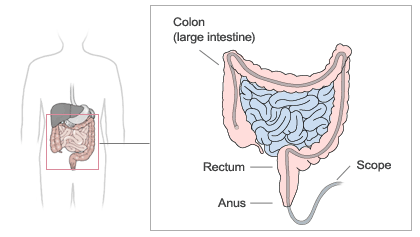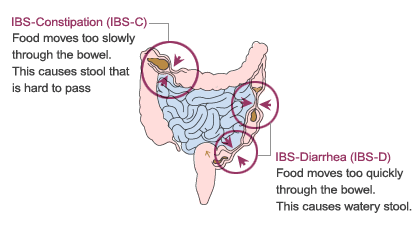Irritable Bowel Syndrome (IBS)
IRRITABLE BOWEL SYNDROME (IBS)
Irritable bowel syndrome (IBS) is a common disorder of the intestines that leads to crampy abdominal pain, gassiness, bloating and changes in bowel pattern. Some people with IBS have constipation (difficult or infrequent bowel movements), others have diarrhea (frequent loose stools, often with an urgent need to move the bowels) and some people experience both. Sometimes the person with IBS has a crampy urge to move the bowels but cannot do so.

 Through the years, IBS has been called by many names – colitis, spastic colon, spastic bowel and functional bowel disease. IBS should not be confused for colitis. Colitis means inflammation of the large intestine (colon), and in IBS, there is no inflammation. IBS does not lead to any more serious organic diseases such as cancer, celiac disease or inflammatory bowel disease (ulcerative colitis or Crohn’s disease). Bleeding, fever, weight loss and persistent severe pain are not symptoms of IBS, and may indicate other problems.
Through the years, IBS has been called by many names – colitis, spastic colon, spastic bowel and functional bowel disease. IBS should not be confused for colitis. Colitis means inflammation of the large intestine (colon), and in IBS, there is no inflammation. IBS does not lead to any more serious organic diseases such as cancer, celiac disease or inflammatory bowel disease (ulcerative colitis or Crohn’s disease). Bleeding, fever, weight loss and persistent severe pain are not symptoms of IBS, and may indicate other problems.
The colon, which is about six feet long, connects the small intestine with the rectum and anus. Colon motility (contraction of intestinal muscles and movement of its contents) is controlled by nerves and hormones and by electrical activity in the colon muscle. The electrical activity serves as a “pacemaker” similar to the mechanism that controls heart function.
The colon muscle of a person with IBS begins to spasm after only mild stimulation. The person with IBS seems to have a colon that is more sensitive and reactive than usual, so it responds strongly to stimuli that would not bother most people.
Many people believe that emotional conflict or stress plays an important role in IBS. While stress may worsen IBS symptoms, other factors are also important.
IBS Triggers
- Certain medicines and foods may trigger spasms in some people. Sometimes the spasm delays the passage of stool, leading to constipation.
- Chocolate milk products or large amounts of alcohol are frequent offenders and can trigger attacks.
- Caffeine causes loose stools in many people, but it is more likely to affect those with IBS.
- Women with IBS may have more symptoms during their menstrual periods, suggesting that reproductive hormones can increase IBS symptoms.
It is important to realize that normal bowel function varies from person to person. Normal bowel movements range from as many as three stools a day to as few as three a week. A normal movement is one that is formed but not hard, contains no blood, and is passed without cramps or pain.
IBS is usually diagnosed after more serious organic diseases are excluded. The evaluation includes a complete medical history, a physical examination and laboratory tests. Diagnostic procedures such as a flexible sigmoidoscopy or colonoscopy may be recommended for further evalution.
There is no standard way of treating IBS. When lifestyle & dietary modifications and stress management do not provide adequate improvement, a number of different natural and prescription medications are available.
